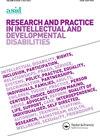Community practitioners supporting young men with borderline intellectual functioning in the criminal justice system: capability for voice and agency
IF 1.1
Q2 REHABILITATION
Research and Practice in Intellectual and Developmental Disabilities
Pub Date : 2020-01-02
DOI:10.1080/23297018.2019.1627902
引用次数: 1
Abstract
This article is based on findings from a recent study of community practitioners working in re-entry and reintegration support services in South East Queensland, Australia, which examined the role and influence of these practitioners on young men with mild intellectual impairment or borderline intellectual functioning who were involved in the criminal justice system. The article reflects upon practitioners’ agentic influence and capability for voice across the community services sectors and proposes the extent to which practitioners believed this affected the options available to vulnerable young men with borderline intellectual functioning in the community. The article draws on data collected from the qualitative study, which included interviews with community practitioners and observations of practitioner–client sessions. These data were analysed using a grounded theory approach. The analytical strategy applied Sen’s capability framework within which to interpret the capabilities of practitioners. Practitioners were drawn from funded community organisations providing offender reintegration services, a homelessness service, and a volunteer community group working with ex-prisoners. Findings suggest that reintegration of vulnerable young men with borderline intellectual functioning requires community practitioners to exercise capability for voice and agency in ways that build relational environments. Interaction between re-entry and reintegration services and the broader community services sector can create practical opportunities for support within the reach of young men with borderline intellectual functioning towards community reintegration.社区从业者支持刑事司法系统中智力处于边缘的年轻人:发言权和代理权
本文基于最近对澳大利亚昆士兰州东南部重返社会和重返社会支持服务的社区从业人员的研究结果,该研究调查了这些从业人员对涉及刑事司法系统的轻度智力障碍或边缘性智力功能的年轻男子的作用和影响。这篇文章反映了从业人员在整个社区服务部门的代理影响力和发声能力,并提出从业人员认为这在多大程度上影响了社区中智力功能处于边缘的弱势青年男子的选择。本文利用了从定性研究中收集的数据,其中包括对社区从业者的访谈和对从业者-客户会议的观察。这些数据是用扎根理论方法分析的。分析策略应用Sen的能力框架来解释从业者的能力。从业人员来自提供罪犯重新融入社会服务的资助社区组织、无家可归者服务和与前囚犯一起工作的志愿社区团体。研究结果表明,要使智力功能处于边缘的弱势青年男子重新融入社会,需要社区从业人员以建立关系环境的方式锻炼他们的发言权和代理能力。重返社会和重返社会服务与更广泛的社区服务部门之间的相互作用可以创造实际机会,在智力功能处于边缘的青年男子力所能及的范围内为重返社会提供支助。
本文章由计算机程序翻译,如有差异,请以英文原文为准。
求助全文
约1分钟内获得全文
求助全文
来源期刊
CiteScore
2.60
自引率
21.40%
发文量
25

 求助内容:
求助内容: 应助结果提醒方式:
应助结果提醒方式:


